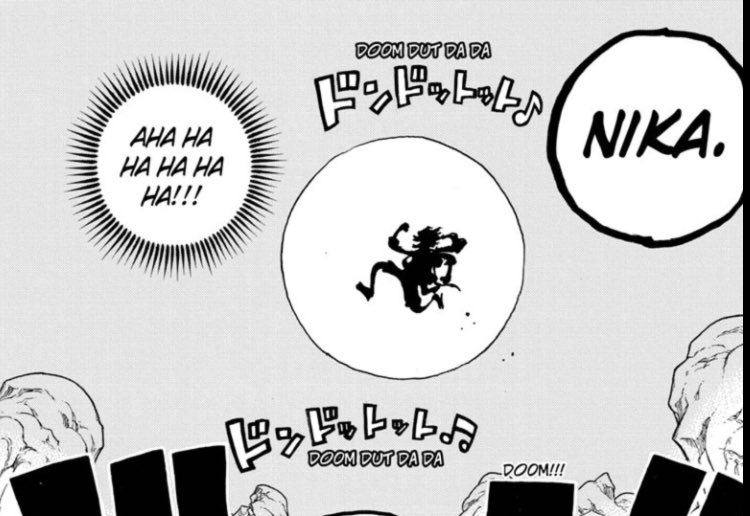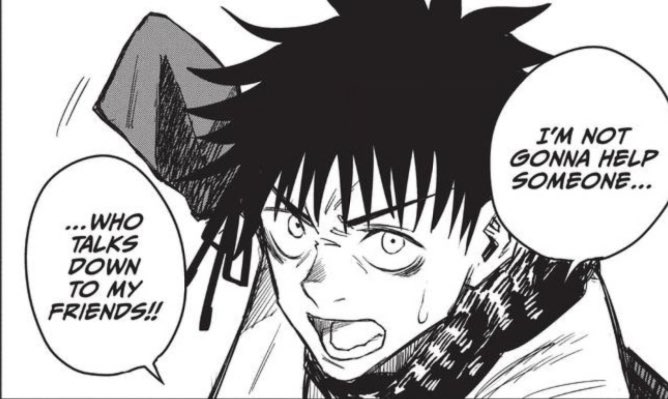“𝑻𝒉𝒆 𝒐𝒏𝒆 𝒘𝒉𝒐 𝒊𝒔 𝒕𝒉𝒆 𝒎𝒐𝒔𝒕 𝒇𝒓𝒆𝒆 𝒊𝒔 𝒕𝒉𝒆 𝑷𝒊𝒓𝒂𝒕𝒆 𝑲𝒊𝒏𝒈”
A thread on Luffy & the theme of Freedom in One Piece
#ONEPIECE
A thread on Luffy & the theme of Freedom in One Piece
#ONEPIECE
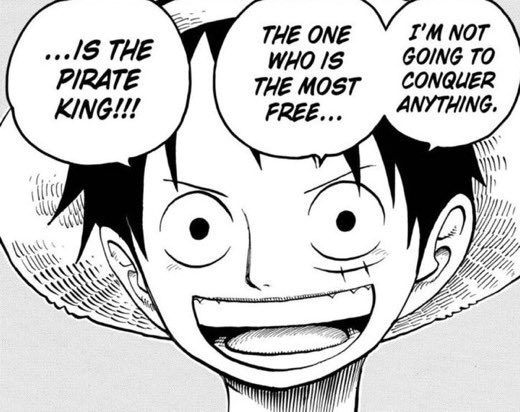
Here we go I guess. I’ve been meaning to write this for a while now but took some time off from writing for a while.
Figured now is as good a time as any to talk about freedom in One Piece.
Figured now is as good a time as any to talk about freedom in One Piece.
I particularly want to talk about Luffy’s changing ideals of freedom, especially before and after Marineford.
I’ll reference a couple of other threads during this and post links at the bottom though.
I’ll reference a couple of other threads during this and post links at the bottom though.
First and foremost, Luffy is an existentialist, he primarily acts on acts of his own agency and Free will and I believe that this from Luffy is where many of the misconceptions of freedom in One Piece form. 

Because all thought Luffy acts freely he is fundamentally not free.
Though Luffy may be an existentialist and free to choose his actions and willing to do exactly what he wants when he wants, so long as people stand in his way he is not free to control the aftermath.
Though Luffy may be an existentialist and free to choose his actions and willing to do exactly what he wants when he wants, so long as people stand in his way he is not free to control the aftermath.
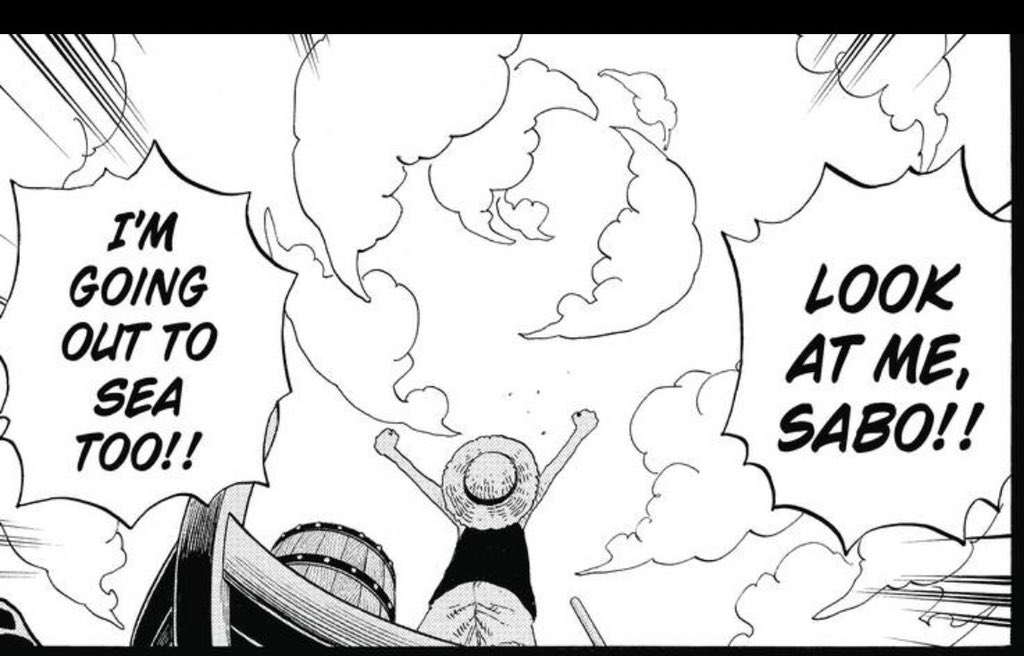
Due to his upbringing with Ace and Sabo the three all strive to become Pirates for different reasons. Ace to prove he’s different from his “evil” bloodline, Sabo to escape his Royal blood… 
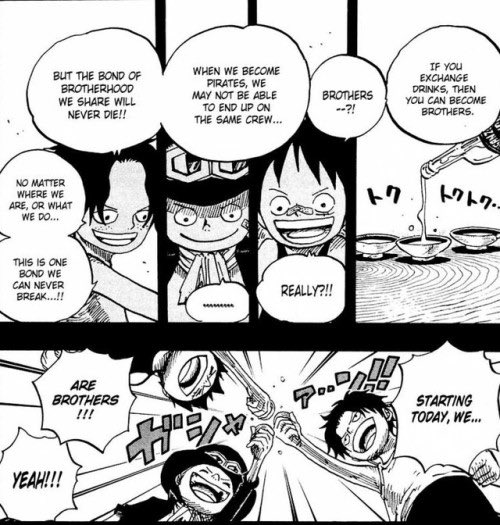
And Luffy to become the freest man on the sea.
To Luffy, being the Pirate King is having been so free that you can travel anywhere unchallenged. He doesn’t intend to rule the world, he intends to see it. Unbound Adventure.
To Luffy, being the Pirate King is having been so free that you can travel anywhere unchallenged. He doesn’t intend to rule the world, he intends to see it. Unbound Adventure.

Luffy goes where he wants and does what he wants, he is free to the extent that he largely always can control where he goes, and if there are things in his way he removes them. 

This largely ties into the concept of Luffy’s amorality and lack of will to be a hero, because hero’s cannot do what they want, they must act heroically and this restricts them.
Luffy is free to choose who he helps and when.
Luffy is free to choose who he helps and when.

He repeatedly throws Law’s plans out the window as soon as his own desire to see an enemy defeated overwhelms the common sense route of the plan.
Luffy charges at Caesar, Doffy and Kaido one after the other to help spread freedom as he sees it.
Luffy charges at Caesar, Doffy and Kaido one after the other to help spread freedom as he sees it.

Doflamingo in particular gives us a clear image of Luffy’s obsession with freedom, his strings wrap and constrict and bind everything beneath him and form a physical barrier to Luffy’s freedom, “suffocating” him. 

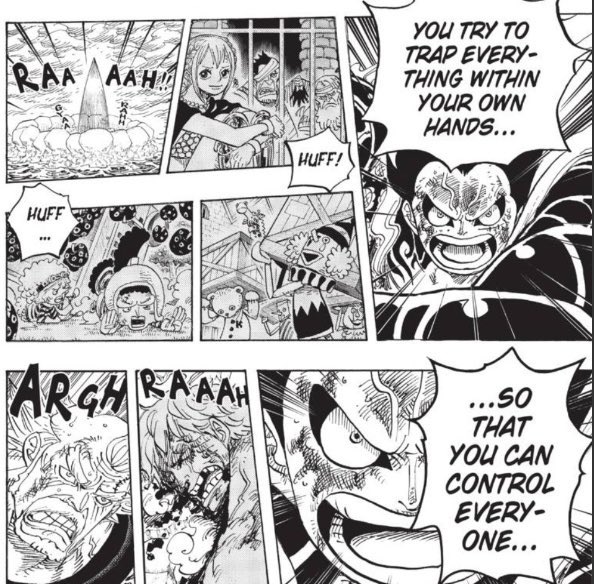

But Luffy’s ideals of freedom are different before and after the Timeskip (well actually before and after they meet Aokiji but that’s slightly different.)
Throughout the pre Timeskip Luffy recklessly acts as he wants and does what he wants.
Throughout the pre Timeskip Luffy recklessly acts as he wants and does what he wants.
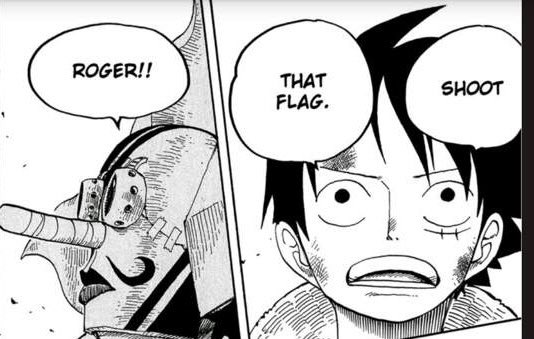
But following the crews decimation at the hands of a single Admiral the idea is planted in Luffy’s head that he is perhaps not as free as he originally thought.
Suddenly there are obvious things in Luffy’s path which may inhibit his adventure.
Suddenly there are obvious things in Luffy’s path which may inhibit his adventure.

At this point Luffy begins to strive to grow stronger, he’ll need to be able to protect the things he loves if he wants to live the way he wants to.
This slowly builds from this point onwards, Admirals, Warlords, The Government itself, all become obstacles.
This slowly builds from this point onwards, Admirals, Warlords, The Government itself, all become obstacles.

This culminates at Sabaody. Luffy pushes against the world as he wishes and suddenly the world starts pushing back and placing restraints on him.
Luffy’s weakness to protect what he loves leads to his crew being blown apart by Kuma.
Luffy’s weakness to protect what he loves leads to his crew being blown apart by Kuma.
These events followed by Luffy charging into a war only to not be able to protect Ace makes Luffy realise fully that he is not truly free unless he can defeat absolutely anyone who may be able to take away the things he loves. 

Because Luffy’s concept of freedom is tied to his concept of adventure, and his sense of adventure is tied to his love of his friends, his found family.
This culminates in Luffy’s declaration of his weakness. While bound in bandages he effectively declares he is not free.
This culminates in Luffy’s declaration of his weakness. While bound in bandages he effectively declares he is not free.

From the return to Sabaody Luffy becomes more fixated on protecting everything and taking everything on his shoulders, we see this fully on Onigashima as he becomes more and more fixated on fighting Kaido alone, to protect everyone. 
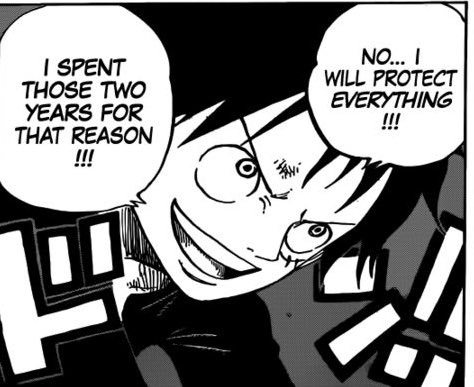
Luffy’s Pirate King dream has become a combination of his desire to be free to adventure and his realisation that to truly be free he must be able to protect what is dear to him.
So long as the Government can take away what he loves Luffy isn’t truly free.
So long as the Government can take away what he loves Luffy isn’t truly free.

This doesn’t detract from his existentialism or his personal freedom of choice, it just means that within the grander scheme of things Luffy can’t really be free until nothing can stop him doing what he wants. Action without negative consequences.
That’s about all I have to say, I just wanted to talk about the difference between freedom of agency and freedom from consequence.
I’ll drop links to @ThePhantomStra5 ‘s threads on Luffy’s existentialism & his thread on the post-Marineford moment as well as my own on morality.
I’ll drop links to @ThePhantomStra5 ‘s threads on Luffy’s existentialism & his thread on the post-Marineford moment as well as my own on morality.
Also I’ve only tackled Luffy’s personal and internalised concept of freedom here, I’ll drop another short thread of him imbuing freedom on others and how that escalates as he becomes stronger in the story. 

Here’s my thread on Luffy’s amorality
https://twitter.com/vsferal/status/1406981661896724493
Here’s Phantom’s thread on Existentialism
https://twitter.com/thephantomstra5/status/1441133394147020829
And Phantom’s thread on this moment
https://twitter.com/thephantomstra5/status/1430615517237321729
• • •
Missing some Tweet in this thread? You can try to
force a refresh




